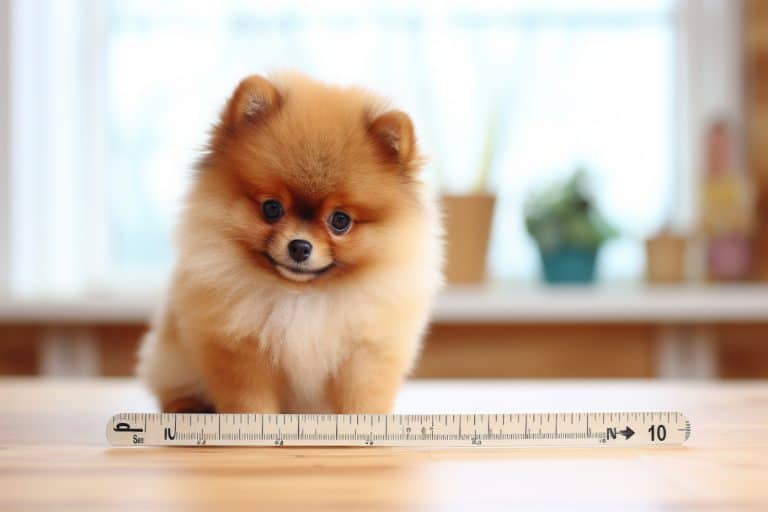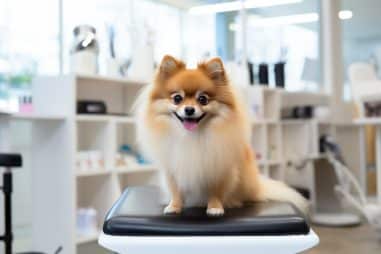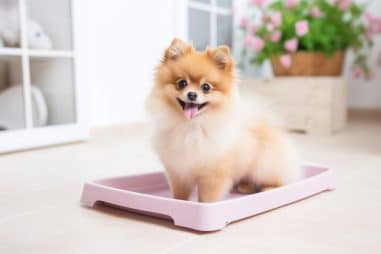Pomeranians are delightful, small-sized dogs full of energy and personality. You might be curious about how big a Pomeranian gets, especially if you are thinking about adopting one or already have this furry friend in your home. Understanding their size involves a look at various factors, such as genetics, diet, care, and even the particular characteristics of their breed. In this guide, you’ll learn everything you need to know about the size of Pomeranians.
Understanding the Pomeranian Breed
The Pomeranian breed has an intriguing history, hailing from the Pomerania region in Northern Europe. They were bred down in size from larger sled-pulling dogs and became favored by royalty.
Characteristics
With their fluffy double coat, erect triangular ears, and lively expression, Pomeranians are easy to recognize. They are playful and intelligent, and often form a close bond with their owners. Their attitude and appearance are part of what you’ll love about them, and knowing these traits can help you understand their size.
Temperament
Pomeranians are known for their spirited and affectionate nature. They may be small in size, but they often act as if they are much larger! This big-dog attitude is part of what makes them so charming.
How Much Should Pomeranians Weigh?
A Pomeranian’s weight is an essential aspect of its size, and it’s something you need to monitor for their overall health.
The Typical Weight Range
Generally, a healthy Pomeranian will weigh between 3 to 7 pounds (1.4 to 3.2 kilograms). This weight can vary slightly, and understanding what influences it can help you care for your Pomeranian properly.
Factors Influencing Weight
Understanding what affects your Pomeranian’s weight is crucial:
- Diet: The right balance of nutrients is vital for healthy growth.
- Genetics: Your Pomeranian’s genes may predispose them to a certain size.
- Health: Medical conditions can cause weight fluctuations.
Consulting with a veterinarian ensures you’re on the right track.
How Big Does a Female Pomeranian Get?
Gender can influence the size of a Pomeranian.
Female Size
Female Pomeranians generally range from 7 to 12 inches (18 to 30 centimeters) in height. They may be slightly lighter in weight compared to males. These differences can vary, and local breed standards might influence them.
Male Size
Male Pomeranians might be slightly larger than females, but the difference is often minimal. Knowing this helps you understand what to expect if you’re comparing male and female Pomeranians.
When Are Pomeranians Full-Grown?
Understanding when Pomeranians reach their full size helps you care for them during their growth stages.
Growth Timeline
Most Pomeranians reach their full adult size around the age of 12 months. However, they might continue filling out and maturing until they are 18 months old. Monitoring their growth helps you ensure they are developing properly.
Puppy Growth
If you have a Pomeranian puppy, you may be eager to know how big they will get. Regular check-ups with a veterinarian and proper care will help your puppy grow into a healthy adult.
Why Is My Pomeranian So Big?
Some Pomeranians might grow larger than the breed standard, and you may wonder why.
Overfeeding
Overfeeding can lead to a larger size, so monitoring their diet is essential.
Lack of Exercise
Without proper exercise, your Pomeranian might become overweight, which adds to their size.
Genetics and Health
Sometimes, the reason behind a bigger size is genetics or underlying health conditions. In such cases, professional advice from a vet is beneficial.
Why Is My Pomeranian So Small?
On the other hand, you might find your Pomeranian to be smaller than usual.
Nutrition
A balanced diet is essential for growth, and a lack of proper nutrition can stunt it.
Health Issues
Underlying health issues might be the cause of a smaller size. Regular vet visits can help identify and address these concerns.
Feeding and Diet
The food you provide plays a crucial role in your Pomeranian’s size.
Proper Nutrition
A well-balanced diet promotes healthy growth and maintains an ideal size. Quality dog food that meets their specific nutritional needs is essential.
Feeding Schedule
Regular feeding times and portion control help keep your Pomeranian at a healthy weight.
Exercise and Lifestyle
Regular activity is vital for your Pomeranian’s overall health and size.
Exercise Needs
Pomeranians need daily exercise to stay fit. Walks, playtime, and mental stimulation keep them happy and healthy.
Lifestyle
The lifestyle you provide, including care, love, and attention, influences their overall well-being and size.
Common Health Issues Related to Size
Pomeranians may face specific health issues related to their size.
Thyroid Problems
Thyroid conditions can lead to weight gain or loss. Regular vet visits can help detect these issues early.
Joint Issues
Being over or underweight can lead to joint problems. Proper care and attention to their size can prevent these concerns.
Conclusion
Pomeranians are loving and lively companions. Understanding how big they get involves looking at their breed characteristics, growth stages, diet, exercise, and potential health issues. By giving your Pomeranian the right care, attention, and love, you ensure they grow to a healthy and happy size. Always feel free to consult your veterinarian if you have concerns about your Pomeranian’s size, as they are there to help you care for your furry friend.








